|
|
 |
Fiche d'espèce de Copépode |
|
|
Calanoida ( Ordre ) |
|
|
|
Clausocalanoidea ( Superfamille ) |
|
|
|
Euchaetidae ( Famille ) |
|
|
|
Paraeuchaeta ( Genre ) |
|
|
| |
Paraeuchaeta aequatorialis Tanaka, 1958 (F,M) | |
| | | | | | | Syn.: | Euchaeta scotti : Wolfenden, 1911 (p.301, figs.F);
Pareuchaeta aequatorialis Tanaka, 1958 (p.348, figs.F,M); Tanaka & Omori, 1968 (p.225, figs.F, Rem.); Vives, 1982 (p.291);
Euchaeta aequatorialis : Park, 1978 (p.276, figs.F);
? no E. aequatorialis : Vervoort, 1963 b (p.172, figs.F,M); Park, 1975 c (p.8, figs.F); Euchaeta aequatorialis : Park, 1978 (p.276, figs.F, Rem.) | | | | Ref.: | | | Roe, 1972 (p.277, tabl.1, tabl.2); Bradford & al., 1983 (p.20); Park, 1994 (p.322, 325, biogéo.); 1995 (p.45, Rem.F,M, figs.F,M); Chihara & Murano, 1997 (p.798, Pl.109,113: F,M); Suarez-Morales & Gasca, 1998 a (p.109); Bradford-Grieve & al., 1999 (p.880, 926, figs.F,M); Razouls & al., 2000 (p.343, Appendix); Hernandez-Trujillo & Esqueda-Escarcega, 2002 (in Appendix) | 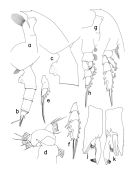 issued from : T. Park in Bull. Scripps Inst. Oceanogr. Univ. California, San Diego, 1995, 29. [p.144, Fig.34]. Female: a, forehead (left side); b, urosome (left); c, genital somite (left); d, Mx1 (first inner lobe omitted), posterior; e, exopod of P1 (anterior); f, exopod of P2 (anterior). Nota: Similar in habitus including urosome to P. scotti, P. mexicana, P. rasa but distinguishable from them by: Laterally, rostrum elongate forehead anterior to suprafrontal sensilla almost straight. Dorsal wall of genital somite wiyj a distinct hump at middle; ventral margin of genital flange only slightly convex or nearly straight, oblique in aposteroventral direction; posterior edge of genital field produced into a relatively wide lobe; anterior margin of genital prominence convex; posterior margin straight, about 2/3 length of posterior ventral wall of somite; a low, rounded ridge close to anterior margin of genital prominence on each side of genital somite. Cephalosomal appendages similar to those of P. scotti except that outer lobe of Mx1 with 5 long setae and a minute seta proximally. Swimming legs similar to those of P. scotti except that in P1 exopod, outer spine of 2nd segment reaching base of following. Male: g, forehead (left); h, P1 (anterior); i, P2 (anterior); j, distal exopodal segments of left 5th leg (lateral, tilted colckwise); k, idem (medial).
|
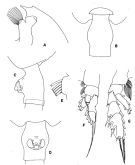 issued from : T. Park in Antarctic Res. Ser. Washington, 1978, 27. [p.277, Fig.116]. As Euchaeta aequatorialis. Female from (33°10'S, 84°W): A, forehead (lateral); B, C, D, distal end of metasome and genital segment (dorsal, left side, and ventral, respectively); E, outer lobe of Mx1; F, P1; G, P2. P1-2: legs (anterior).
|
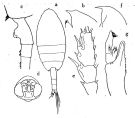 issued from : O. Tanaka in Publs Seto Mar. Biol. Lab., 1958, VI (3). [p.349, Fig.72]. As Pareuchaeta aequatorialis. Female: a, habitus (dorsal); b, forehead (lateral left side); c, last thoracic segment and urosome segments (lateral left side); d, genital complex (ventral); e, exopod of P2. Nota: The proportional lengths of the firs three urosome segments are 39:19:18. A1 extends to the middle of the last thoracic segment. Male: f, forehead (lateral left side); g, terminal segments of left P5. Nota: The urosome segments and furca are in the proportional lengths as 24:25:21:16:5:9 = 100.
|
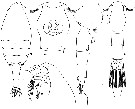 issued from : W. Vervoort in Atlantide Report., 1963, 7. [p.172, Fig.18]. As Euchaeta aequatorialis. See in Remarks. Female (from Angola-Sierra-Leone): a, habitus (dorsal); b-c, posterior part cephalothoras and urosome (dorsal view and lateral view from right side, respectively); d, genital somite (ventral); e, forehead (lateral). (a: x20; b, c, e: x44; d: x88).
|
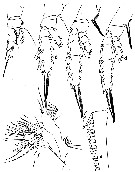 issued from : W. Vervoort in Atlantide Report., 1963, 7. [p.173, Fig.19]. As Euchaeta aequatorialisFemale: a-d, P1 to P4; e, part of the row of teeth along apical spine of exopodite P4; f, Mx1. (a-d: x55; e: x240; f: x125).
|
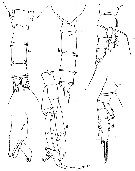 issued from : W. Vervoort in Atlantide Report., 1963, 7. [p.174, Fig.20]. As Euchaeta aequatorialis. Male (from Angola-Sierra-Leone): a-b, posterior part cephalothorax and urosome (dorsal and lateral view from right side); c, P1; d, P2; e, P5; f, extremity of exopodite of left P; (a, b; d, e: x55; c: x88; f: x135).
|
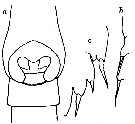 issued from : R.N. Wolfenden in Die Marinen Copepoden der Deutschen Südpolar-Expedition 1901-1903, 1911. [p.301, Fig.53]. As Euchaeta scotti. Female: a, genital segment (ventral); b, outer margin of exopod of P1; c, outer margin of exopod of P2.
|
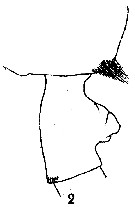 issued from : R.N. Wolfenden in Die Marinen Copepoden der Deutschen Südpolar-Expedition 1901-1903, 1911. [Pl.XXXV, Fig.2]. As Euchaeta scotti. Female: 2, corner of the last thoracic segment and genital segment (lateral, right side).
|
 Paraeuchaeta aequatorialis Paraeuchaeta aequatorialis Female: 1 - See key to species Groups and independent species of Paraeuchaeta (p.30): malayensis species Group. 2 - Outer spine of 2nd exopodal segment (or the 2nd of the first 2 exopodal segments forming a proximal, compound segment) of P1 normally developed (Fig.34-e). 3 - Outer lobe of Mx1 with 5 long setae (Fig.34-d). 4 - Laterally, genital prominence low with more or less convex genital flanges. 5 - Laterally, rostrum well developed (Fig.34-a). 6 - Laterally, posterior margin of genital prominence distinct from posterior ventral wall of somite (Fig.34-c). 7 - Genital somite without conspicuous conical process on left side (Fig.34-c). 8 - Laterally, genital prominence with a low ridge close to anterior margin (Fig.34-c).
| | | | | Ref. compl.: | | | Teuber & al., 2013 (p.1, Table 3, enzyme activity); Park & Ferrari, 2009 (p.143, fig.1, biogeography); Bode & al., 2015 (p.268, Table 1, 2, figs.3, 4, chemical components, trophic level, geographic zone); Bode & al., 2018 (p.840, Table 1, respiration & ingestion rates, depth) | | | | NZ: | 11 | | |
|
Carte de distribution de Paraeuchaeta aequatorialis par zones géographiques
|
| | | | | | | | | | | | 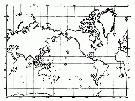 issued from : T. Park in Hydrobiologia 292/293, 1994. [Fig. 1, p.325].
Geographical distribution of Paraeuchaeta aequatorialis (circle). issued from : T. Park in Hydrobiologia 292/293, 1994. [Fig. 1, p.325].
Geographical distribution of Paraeuchaeta aequatorialis (circle). |
 Issued from : M. Bode, R. Koppelmann, L. Teuber, W. Hagen & H. Auel inGlobal Biogeochemical Cycles, 2018, 32. [p.844, Table 1). Issued from : M. Bode, R. Koppelmann, L. Teuber, W. Hagen & H. Auel inGlobal Biogeochemical Cycles, 2018, 32. [p.844, Table 1).
Cf. explanations of these measures in Calanoides natalis from the same authors.
Compare with Euchaeta marina, Paraeuchaeta gracilis. |
| | | | Loc: | | | Antarct. (SE Pacif.), sub-Antarct. (SE Pacif., Drake Passage), Atlant. equatorial (off E St. Paul Is.), off Mauritania, Canary Islands, E Indian, Bay of Bengal, Indonesia-Malaysia, China Seas (South China Sea, East China Sea), Japan (Sagami, Suruga), Pacif. (E, SE & central N), Chile (in Yamanaka, 1976, p.170) | | | | N: | 9 | | | | Lg.: | | | (3) F: 5,4-4,8; M: 4,9-4,6; (10) F: 4,85; (20) F: 5,16; (63) F: 5,61-5,05; M: 4,74; (99) F: 5,3; M: 4,7; (199) F: 4,96; {F: 4,80-5,61; M: 4,60-4,90} | | | | Rem.: | Méso-bathypélagique.
Sampling depth (Antarct., sub-Antarct.) : 500-1000-3000 m
Lapernat (comm. pers., 2000) confirme la présence de cette espèce off Mauritanie.
Une confusion est possible entre cette espèce et P. mexicana, si toutefois, ces deux espèces sont réellement distinctes.
Voir aussi les remarques en anglais | | | Dernière mise à jour : 23/11/2020 | |
|
|
 Toute utilisation de ce site pour une publication sera mentionnée avec la référence suivante : Toute utilisation de ce site pour une publication sera mentionnée avec la référence suivante :
Razouls C., Desreumaux N., Kouwenberg J. et de Bovée F., 2005-2026. - Biodiversité des Copépodes planctoniques marins (morphologie, répartition géographique et données biologiques). Sorbonne Université, CNRS. Disponible sur http://copepodes.obs-banyuls.fr [Accédé le 05 février 2026] © copyright 2005-2026 Sorbonne Université, CNRS
|
|
 |
 |












